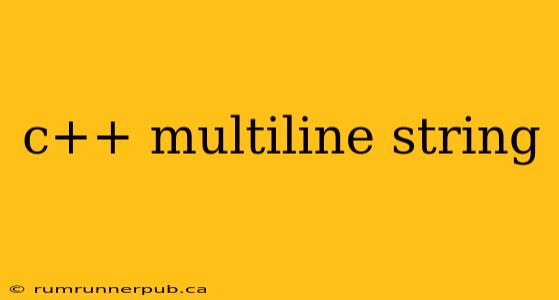Working with multiline strings in C++ can be cumbersome if you're not aware of the best practices and available techniques. Before C++11, handling multiline strings was often a messy affair involving string concatenation or character arrays. Fortunately, modern C++ offers cleaner and more efficient solutions. This article explores several methods, drawing upon insights from Stack Overflow, to help you effectively manage multiline strings in your C++ projects.
Method 1: Raw String Literals (C++11 and beyond)
This is arguably the most elegant and widely recommended approach for multiline strings in modern C++. Raw string literals allow you to embed newlines directly into your strings without needing escape sequences.
Example (inspired by several Stack Overflow answers discussing raw string literals):
#include <iostream>
#include <string>
int main() {
std::string multilineString = R"(This is a multiline string.
It spans across multiple lines
without the need for escape characters.
)";
std::cout << multilineString << std::endl;
return 0;
}
Explanation:
The R"(...)" syntax defines a raw string literal. The parentheses (...) enclose the string, and any characters within, including newlines, are interpreted literally. This eliminates the need for escaping special characters like \n or \t. The R" prefix indicates a raw string literal. You can also use other delimiters instead of parentheses, as long as they are consistent at the beginning and end. For example R"delimiter(this is a string)delimiter" is valid.
Advantages:
- Readability: Raw string literals make your code much cleaner and easier to read, especially when dealing with lengthy multiline strings.
- Maintainability: Avoiding escape sequences reduces the chance of errors and simplifies code maintenance.
- Efficiency: The compiler handles the string directly, without the overhead of escape sequence processing.
Method 2: String concatenation (pre-C++11 and for specific cases)
Before C++11, string concatenation was a common technique for creating multiline strings. While less elegant than raw string literals, it remains a viable option in certain situations or when working with older compilers.
Example (inspired by Stack Overflow discussions on pre-C++11 techniques):
#include <iostream>
#include <string>
int main() {
std::string multilineString = "This is the first line.\n"
"This is the second line.\n"
"This is the third line.";
std::cout << multilineString << std::endl;
return 0;
}
Explanation:
This approach uses the \n escape sequence to represent newline characters. Each line is concatenated together using the compiler's implicit string concatenation feature enabled by placing strings next to each other.
Advantages:
- Compatibility: Works with older C++ compilers that don't support raw string literals.
- Fine-grained control: You have precise control over the formatting of each line, which can be useful in certain contexts.
Disadvantages:
- Less Readable: Can become less readable, especially with longer strings.
- Error-prone: Incorrectly placed escape sequences can easily lead to errors.
Choosing the Right Method
For most modern C++ projects, raw string literals are the preferred method for creating multiline strings due to their improved readability, maintainability, and efficiency. However, understanding string concatenation remains important for legacy codebases or situations requiring precise control over formatting, particularly before C++11.
Beyond the Basics: Handling Special Characters
While raw string literals handle most characters literally, be mindful of situations requiring special handling for characters like ) in your delimiter. In such scenarios, you might need to use alternative delimiters or escape those characters within your raw string literals.
This article provides a solid foundation for effectively working with multiline strings in C++. Remember to choose the method that best suits your project's needs and coding style while prioritizing readability and maintainability. By leveraging the insights from Stack Overflow and applying these techniques, you can significantly enhance the quality and clarity of your C++ code.
